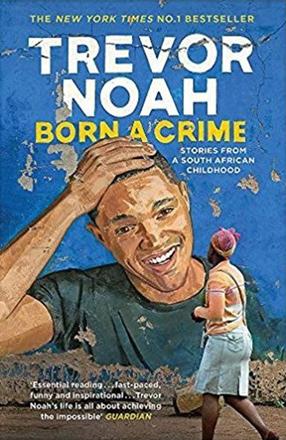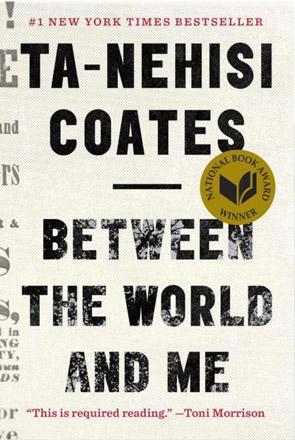You are here
Navigating apartheid and its aftermath
By Sally Bland - Mar 10,2019 - Last updated at Mar 10,2019

Born A Crime: Stories from a South African Childhood
Trevor Noah
UK: John Murray, 2017
Pp. 288
Watching Trevor Noah host “The Daily Show”, one gets the impression of a rather cosmopolitan young man, but yet not one who is jaded. One might assume that his being cosmopolitan is a result of his successful career in the West, but his memoirs, as recorded in “Born A Crime”, attest to the roots of his sophistication as being genuinely South African.
Being born the son of a black mother and a white father made him something of an anomaly in a highly racialised society, but being an outsider also allowed him to move between various subcultures, racial categories, tribes and languages. How he navigated these makes for an exciting and sometimes hilarious story, full of adventure, danger and small, unexpected triumphs.
The book’s title stems from the fact that sexual relations between blacks and whites were strictly forbidden in apartheid South Africa, but the “crime” did not stop at birth. He and his mother had to sneak around to even visit his father, and he was out-of-place in both black and white society. Growing up in Soweto and different suburbs in the Johannesburg area, he was often treated as white in black society, and black in white society; the only category he appeared to belong to was coloured, which he actually had nothing in common with. At an early age, the illogic, arbitrariness and injustice of apartheid and its categories became obvious to him. His critique of the government’s Bantu education system designed for blacks is particularly searing, as is his condemnation of black-on-black violence, particularly the abuse of women.
The overwhelming presence in his memoir is his mother, and his early insights are almost solely attributable to her upbringing. Not only was she his primary caregiver, since his father could not live with them, she was simply an indominable woman who refused the limitations of apartheid to an unprecedented degree. This caused Trevor to identify with black society, even though he stuck out like a sore thumb. As a young woman, Patricia Nombuyiselo Noah fled her family in the township to live illegally in downtown Johannesburg, took a secretarial course, obtained a job normally ruled out for blacks, and met Trevor’s father. All this was forbidden, but she was intrepid.
Trevor’s memoirs are a case study in how apartheid laws trickled down to policing simple everyday things like who you walked in the park with. Just mother and son walking in the street could be cause for trouble, whether from the police or passersby. Anyone “born a crime” lived in constant peril. “A million things had to go right for us to slip through the cracks the way we did for as long as we did.” (p. 22)
Patricia was also deeply religious, and this sharpened Trevor’s debating skills when he did not share her literalist interpretations of God and Jesus. Due to his mother’s strict beliefs, he had little exposure to popular culture. Rather, he spent whole days at church activities and read voraciously, making him a self-taught intellectual.
Noah was five when Nelson Mandela was released from prison, so his growing up was a time of great upheaval and transition from strict apartheid to limited reforms and later relative democracy. His portrayal of these events is not in line with the usual overarching themes of popular struggle and democracy. While he does not dispute them head-on, his concern is over the deep tracks left in people’s consciousness by the racist system. “The genius of apartheid was convincing people who were the overwhelming majority to turn on each other.” (p. 3)
Indeed, many of the problems he faced were from his fellow blacks — the legacy of apartheid’s divisiveness, enforced poverty and ignorance.
As a child and teenager, he was always in trouble and there are many graphic chase scenes, where he is running from his mother or the police. Each phase of his life was filled with new obstacles and problems which Trevor most often depicts with sly humour and irony. Yet, he was also perpetually inventive, earning pocket money and more by selling pirated CDs and being a DJ for street parties, a business conducted in the school yard, which grew exponentially on the streets when he graduated with no prospect for university or a better job. In his sidewalk business, he benefitted from international trends. “The walls of apartheid were coming down just as American hip-hop was blowing up, and hip-hop made it cool to be from the hood” — comparable to the townships of South Africa. (p. 204)
He continued making a living in this way until a policeman destroyed his computer and CD-writer.
Noah has a way with words, and his narrative is lively, street-wise lyrical and charming. Many terrible things happened to him and those around him, but this is not a sob sorry. Rather, it is a critique of apartheid and others forms of injustice from a very personal and down-to-earth angle. As the book ends, he is still in South Africa; he does not write about how he launched his successful international career, but the inspirational message of his rags-to-riches story is clear. Most admirably, he expresses only compassion for those victims of apartheid and other violence who did not make it to the top.
“Born a Sin” is also available in audiotape, read by the author.
Related Articles
Trevor Noah, a South African comedian little known to US audiences, will replace Jon Stewart as the host of the Emmy Award-winning, late-night parody newscast “The Daily Show”, Comedy Central said on Monday.
Between the World and MeTa-Nehisi CoatesNew York: Spiegel & Grau, 2016Pp.
Summertime: Scenes from Provincial LifeJ. M. CoetzeeLondon: Vintage, 2010Pp. 266 J. M.

















